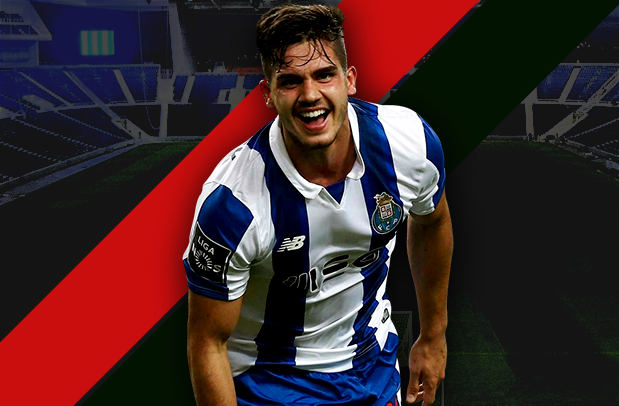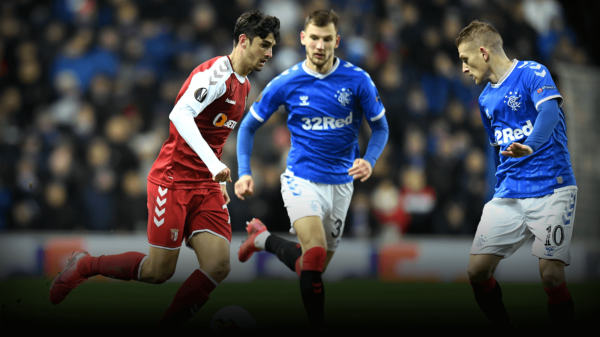Mateus Carvalho writes a detailed scout report on André Silva, Porto’s complete striker.

With the advent of contemporary football and rise of new tactical trends, the role of the classical striker began to be neglected by a lot of sides, with new demands being made from the most advanced player in the field, in terms of pressing and possession-control. In Portuguese football this was particularly evident, as coaches and youth-directors alike opted to erode the stereotype of the “standard striker” not by producing new offensive references in their ranks with developed and modern characteristics, but by searching for them overseas, often paying large sums of money.
Despite the successful lineage of such forwards (like Falcão, Jackson Martinez, Saviola or Lisandro Lopez), this practice started to be reversed due to the large number of failed signings and experiments of this sort. So, it was a blessing when André Silva, a 20-year old academy-made Portuguese striker, appeared in the first team of Porto and, soon enough, in the national Portuguese teams, being the successor of famous Portuguese strikers of Porto and Portugal, such as Domingos Paciência or Pedro Pauleta.
Who is André Silva?
Born in Baguim do Monte, a small village in the north of Portugal, on the 6th November 1995, André Silva started playing football as a youngster at local but important northern clubs, such as Salgueiros, Boavista or Padroense. Although he already demonstrated natural ease in finishing offensive manoeuvres, he played more often as an offensive midfielder or a winger, a background which definitely played a huge role in his identity as a player, enabling him to be a complete striker, not just capable of scoring.
The success he attained in these clubs granted him the opportunity of playing for FC Porto. He arrived at the club in 2012, immediately establishing himself as the lead striker of their junior team and surmounting the expectations every youth director had of him with 28 goals in 33 games. As his success continued in the next season (19 goals in 26 games) he was promoted to the secondary Porto side, a second-tier Portuguese team. And although he continued to show promising signs mainly through his excellent performance in every national youth team with 28 goals in 47 matches, being the second best scorer of the u-19 European championship with 5 goals in 5 games, only surpassed by current RB Leipzig startlet Davie Selke, he started to lose the consistency demanded of every striker. Only 12 goals in 62 games in two seasons at Porto B and FC Porto’s directors started to doubt his future at the club, delaying his contract renewal which brought the attention and consequent proposals of clubs like AC Milan or Sporting CP. Despite all of this and with an in extremis move by Porto, André Silva signed a new contract with the dragons in 2014 and finally was granted the emotional stability to continue his development.
Talent Radar Accolades
Naturally, he exploded and displayed his full potential, mainly in the 2015/2016 season: he managed to score 15 goals in 31 games at Porto B, being named the best player of the Portuguese second division and was promoted in the middle of the season to the first team. Although his debut was firstly spoiled by a poor collective spell of FC Porto with Julen Lopetegui, he was granted the initial spot in the line-up at the end of the season, delighting the fans with 3 goals in 14 matches, 2 of them in the 2-3 defeat against SC Braga in the Portuguese Cup final, one of them with a superb bicycle kick.
As this season started and Nuno Espíritio Santo, former Valencia coach, was charged with conducting FC Porto, André Silva got definitely hold of a spot in the senior team, relegating Vincent Aboubakar to the bench and ultimately out of the club with an astounding pre-season (7 goals in 7 matches). He has maintained this spot at Porto so far, playing regularly whether domestically or in the Champions League and displaying all of this completeness as a modern striker (20 matches, 10 goals and 3 assists), which ultimately granted him a place at the European Champion’s national team not only in the lot chosen by the coach but in the line-up, sitting the national hero Éder in the bench. In 5 matches for Portugal, he already registers an impressive total of 4 goals, promising to become the offensive reference Portuguese fans desired in order to give Cristiano Ronaldo a suitable partner in the specific position André Silva plays.
What are his Strengths?
Standing at 185 cm, André Silva does not possess the traditionally required monumental physical structure of a striker, but this only constitutes a mere illusion as he has the power and strength of the good old-fashioned forward. This enables him to amount impressive and substantive individual performances as far as ratio of goals/matches is concerned, as proven above. But what makes Silva unique is undoubtedly his diverse qualities that transform him into a modern forward, able to keep possession, to help in the build-up, to maintain a constant high-pressing reaction to the ball loss and construct and distribute goal opportunities to his teammates. His youth background surely helps understanding this (played as a midfielder for a long part of his formation as a footballer, having Deco, the Portuguese no. 10, as a reference). André Silva manages to combine his vigour and resilience with generous pace and incredible agility, often appearing in the wings as the game unfolds and demonstrating incredible ease at providing successful crosses for a striker.
Another distinctive characteristic of his style of play is his heading. His jumping reach is extraordinary and the percentage of successful headers is higher than that of an ordinary striker. Lastly and as a consequence of his mobility in the field he shows a matured and broad tactical understanding of the game, being able to offer the team interesting solutions in their offensive plays ,his intelligence in occupying the half-spaces between the full-backs and centre-backs in simply brilliant; and mainly to show efficiency and maintain his profitableness in terms of goals in various tactical systems. He has played this season both in 1-4-3-3 and 1-4-4-2 approaches as Nuno Espírito Santo enjoys making tactical changes throughout the season and has been able to score in either tactical system, a competence very few strikers possess.
What are his Weaknesses?
Consistency has always been a problem for André Silva. Although he scores a lot of goals, he often spends enormous periods of time without any goal, compensating with stellar performances in brief sequences of matches. This does not happen every time but is a clear tendency in the yet short career of the Portuguese starlet that could be hypothetically surpassed with an improvement in his capacity to use his weak foot. Imagine what he could do if he was able to join his already marvellous heading capacities with an equal scoring proficiency with both feet!
Also, he sometimes finds trouble when facing more experienced defenders or defensive collective models. He irrationally attempts to solve this kind of situations by forcing countless 1×1 duels in a stumbling fashion only caused by his discomfort in front of imposing defenders, because he has the skillset to succeed in this kind of encounters. In addition, when his team is playing extremely organised sides which leaves little space for him to receive the ball, he tends to aimlessly roam around the field. This kind of movement impedes and harms his chances of scoring goals when he goes too far from the opposite box. For example, in a recent match against København he performed a total of 52 actions, only 5 of which were carried out inside of the opposite’s side box. As a consequence he had only two attempts, neither of them dangerous and naturally amounting to zero goals. If he manages to use his qualities in a rational and patient manner he will most definitely enter the elite category of Portuguese footballers.
- 2020-21 Liga NOS: Young Players To Watch - October 15, 2020
- Can Leeds reclaim their position as a regular Premier League club? - October 7, 2020
- Scout Report: Trincão | Barcelona’s newest youngster - July 8, 2020

























































